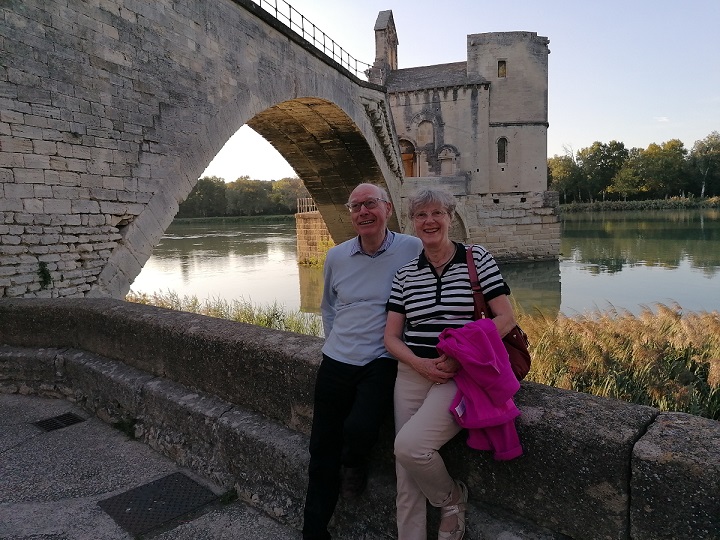La route des quatre chansons
The road of the four songs
Georges Brassens (1964)
|
|

Touristes devant le Pont d'Avignon (Sept. 2022)
NOTES
|
Les quatre chansons auxquelles Brassens fait référence sont les chansons populaires suivantes : "Sur la route de Dijon", "Sur le pont d'Avignon", "Dans la prison de Nantes", "Auprès de ma blonde". Au-delà du texte, on peut entendre l'air de ces quatre chansons en prêtant une oreille attentive (2ème guitare). L'idée générale est sans doute l'antienne «C'était mieux avant!» On peut trouver la démonstration peu convaincante car, dans au moins 3 de ces chansons, transpire, de manière à peine voilée, un machisme qui serait très mal perçu par les mouvements féministes modernes. Par bonheur, pour parler comme Brassens, "De réformer et rendre honnêtes Nos vénérables chansonnettes Les "autrices" et "écrivaines" N'ont pas pris à ce jour la peine." Il leur a peut-être échappé que, - La "geôlière" des Prisons de Nantes est une naïve qui se laisse berner par le prisonnier dont elle a la garde et qui s'évade. - La « blonde » de la chanson semble être avant tout préposée au "repos du guerrier". - Quant à la « Route de Dijon » qui raconte comment tout un bataillon "consola" la pauvre Marjolaine, elle est d'une ambiguïté choquante. |
The four songs Brassens refers to are the following popular songs: “On the road to Dijon", "On the bridge of Avignon", "In the prison of Nantes", "Near my fair sweetheart". Beyond the text, we can hear the air of these four songs by listening attentively (2nd guitar). The general idea is undoubtedly the old ranting: "Back then, everything was better!" This assertion one may question, since, in at least 3 of these songs, there transpires, in a barely veiled way, a machismo which would be very badly perceived by modern feminist movements. Fortunately, to speak like Brassens; "To reform and to tamper with Our venerable ditties, Is a thing that no "writeress" Ever did bother to address." They seem to have overlooked that: -The "jailer" of the Prison of Nantes is a naive girl who accepts to be fooled by the escapist-prisoner in her custody. - The "fair-haired girl" of the fourth song seems to be there, above all, for ensuring the "rest of some warrior". - The "Road to Dijon" song, which tells how a whole battalion "consoled" poor Marjolaine, is shockingly ambiguous. |
Brassens chante "La route des quatre chansons"

Les 4 chansons de la chanson
The four songs in the song
|
|
|
|
|
|
|
|
Les quatre chansons de la chanson de Brassens